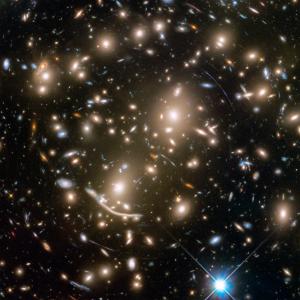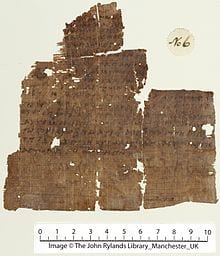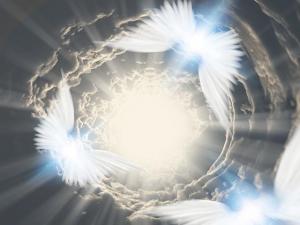
Thinking about the “things visible and invisible” of the Nicene Creed has resulted in several posts about angels and their “essential” relation to the visible world. “Essential” is Karl Rahner’s word. I’ve been trying to flesh that out with Walter Wink’s and my own suggestions.
Wink discusses angels primarily, though not only, as the “within” of the products of human history—communities, institutions, established roles, ideologies, and such. I have looked also to the area Wink passes over too quickly, the non-human cosmos. I imagined the transcendental properties of being, i.e., truth, goodness, and beauty, as names of angels. Angels, I thought, must be independent of us humans, but not independent of the cosmos.
The animating intuition behind these attempts is the thought that God created only one world and story, not a world/story for angels and another for the material world. It’s a thought with which, I think, Rahner would agree. In this post I’m looking for the unity, or some connection in one story, which must exist between angels of the cosmos and angels of history. The next post will conclude with some tentative summary statements of my belief in angels.
Connecting angels in one story
Previously, I suggested truth, goodness, and beauty as candidates for angels. They have their material embodiments not directly in human affairs but in the pre-existing cosmos. They are ways that the cosmos (a word for a universe that has its own meaning) supports, respectively human intelligence, morality, and aesthetic sensibility.
Now I’m searching out ways the cosmos and its angels are related to more specific human creations and their angels, of which Wink gives insightful account. Historically, we have created communities, hierarchies, institutions, customary ways of thinking and acting, in short, a history. If it is one story that God and creation tell, then there must be connections between cosmos and history.
A balancing act
Angels don’t act, purposefully or not, for us or against us. There is no scientific evidence for them. They do not provide easy explanations when other explanations fail. Rather, these “principles” simply are, praising God by what they are. We, along with the universe, participate in their being, embodying what they are. For example, a sunset, a rainbow, and a work of art are beautiful, giving body to the angel Beauty.
Angels are God’s good creations. Walter Wink thinks they exist in a fallen state, along with the rest of creation. I have interpreted that to mean that in them we find the temptation to worship something other than God. When we worship an angel, say truth, science’s angel, or the angel of a nation or an economic system, that angel become demonic, a devil to us. It’s the Church’s job to teach that wayward angel, with its worldly embodiment, the ways of God.
The angels, or cosmic principles, I have in mind for this post also can become demonic. They come in pairs, and the idolatry that demonizes them consists in worshiping one at the expense of the other. These angel pairs are properties evident throughout the non-human cosmos. They relate to human history by the ways we balance them or fall to one extreme or another and throw life out of balance.
Paired angels of the cosmos
A previous post listed the nine traditional choirs of angels with descriptions taken from Catholic Online. Some of them relate to history, others to cosmic realities. Among the cosmic sort are:
- Thrones: They reside in the area of the cosmos where material form begins to take shape.
- Virtues: They are the spirits of motion and control the elements. The virtues govern all nature. They have control over seasons, stars, moon, sun, planets, keeping the cosmos in order.
Here I try my hand at listing some cosmic angels. They come in pairs, and with each pair I include some ways the pair supports or disrupts human life through proper balance or idolatry:
- Angel pair: identity and relation
- Proper balance—We live as individuals in community.
- Idolatries–We live for ourselves or become functionaries in an oppressive “they.”
- Angel pair: stability and change
- Proper balance—Sufficient order makes creativity possible.
- Idolatries—We are stuck in institutional rigidity or chaos.
- Angel pair: necessity and chance
- Proper balance—We make responsible use of freedom.
- Idolatries—We submit to fate or indulge every impulse and ignore the consequences.
- Angel pair: motion and rest
- Proper balance—We engage in meaningful action and enjoy times for play and contemplation.
- Idolatries—Our energy dissipates in directionless activity or we withdraw from life’s struggles.
The devil’s power and angelic freedom
There’s an important difference between devils and angels: Speaking mythologically, a devil loves power; an angel doesn’t want it. Less mythologically, when we submit to the temptation to idolatry, that idol has power over us. Angels in the old stories understood the danger of power. Though they struck fear into the heart of whoever they appeared to, they refused to operate on that basis. Their words of greeting, “Do not fear,” meant that they would not use the power that they appeared to have.
We have words for these demonic powers; often they end in “ism.” They are necessary words, but we need to take care not to be controlled by them. “Capitalism” and “socialism,” for example, express legitimate economic concerns relating to the individual and the community. Together they embody the angels of identity and relation. But as an ideology either one has demonic power if we submit to it. It controls rather than guides. It results in glorifying the state in communist regimes and harsh individualism in the capitalist world.
Is there an ideology for proper balance of identity and relation? It’s hard to find a word for it, but that only means we must make the way ourselves with hard work and intelligence. If there’s an angel for that, it’s not a controlling one. Devils do controlling.
Freedom is creative. It operates within stability and change. It avoids rigidity and chaos. Freedom is responsible. It avoids the law-and-order mentality, reactions following actions with ironclad necessity. It includes freedom to forgive. Karma doesn’t have the last word. Freedom commits without binding. It is hard work and also the ability to let go.
A universe has its own laws, but in a cosmos only devils bind. Angels set us free.
Image credit: Cosmos Magazine via Google Images















